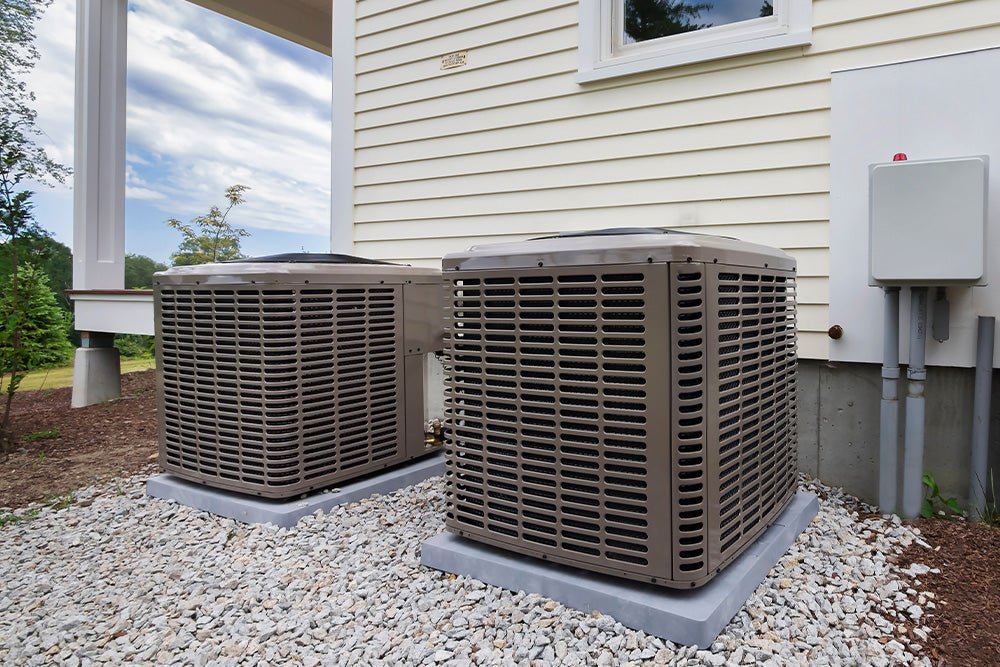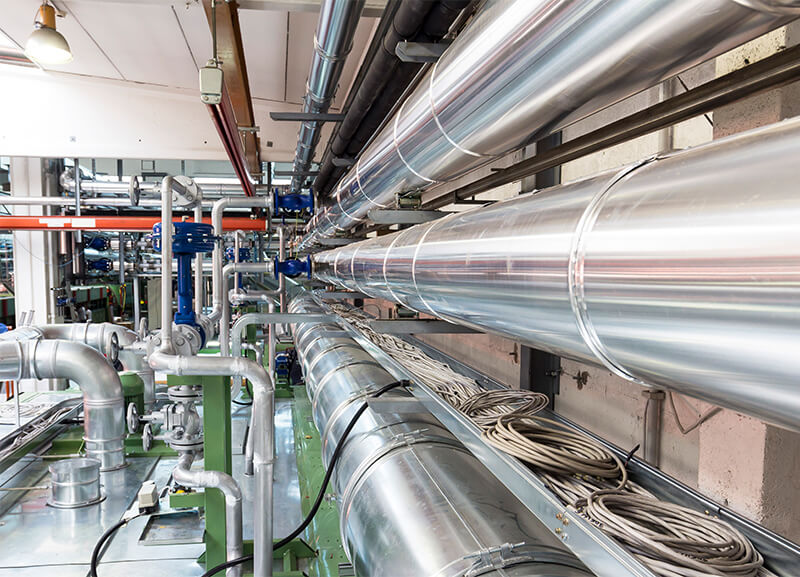See how HVAC experts improve resale value with proper care
Wiki Article
Exploring the Important Elements of an Efficient Heating And Cooling System
An efficient HVAC system is improved several critical elements that function in consistency. Each component, from the thermostat to the ductwork, plays an essential duty in maintaining convenience and energy efficiency. Comprehending these components is vital for enhancing performance and improving indoor air top quality. As one analyzes these components, the detailed connections in between them disclose understandings into boosting overall system effectiveness. What certain variables contribute most to this effectiveness?The Duty of the Thermostat in Cooling And Heating Performance

Frequently neglected, the thermostat plays a crucial duty in the efficiency of HVAC systems. This tiny device works as the key control center, regulating temperature setups and making sure excellent convenience within an area. By accurately picking up the ambient temperature level, the thermostat interacts with the air, ventilation, and home heating conditioning systems to preserve the wanted environment
An effective thermostat decreases energy intake by triggering the heating and cooling system only when required, consequently avoiding too much heating or air conditioning. Modern wise and programmable thermostats boost this performance better by permitting users to set routines and remotely readjust settings, adjusting to everyday regimens.
The positioning of the thermostat is vital; improper area can lead to inaccurate temperature analyses, resulting in ineffective procedure. Overall, a well-functioning thermostat not only improves convenience yet also adds significantly to power cost savings and the durability of the a/c system.
Understanding the Importance of Air Filters
Air filters serve a necessary function in cooling and heating systems by guaranteeing that the air flowing within a room remains tidy and healthy. These filters catch dirt, allergens, and other pollutants, avoiding them from being recirculated throughout the atmosphere. By recording these bits, air filters add to improved interior air quality, which can considerably benefit owners' health and wellness, specifically those with allergies or respiratory system problems.Furthermore, preserving tidy air filters improves the efficiency of cooling and heating systems. Stopped up filters can restrict airflow, triggering the system to work harder to preserve preferred temperature levels, bring about increased power intake and higher energy costs. Regularly changing or cleaning up filters is an important upkeep step that can prolong the life expectancy of heating and cooling tools. Eventually, understanding the value of air filters permits homeowners and structure managers to take positive steps to ensure a well-functioning, efficient a/c system that promotes a comfortable and risk-free indoor environment.

The Functionality of the Heating System and Heatpump
Heating systems and heatpump are crucial components of HVAC systems, accountable for supplying warmth throughout chillier months. Furnaces operate by heating air through burning or electrical resistance, then distributing it throughout the home by means of ducts. They normally use quick home heating and can be fueled by gas, electrical power, or oil, depending on the system type.On the other hand, heatpump move warm instead of generate it. They extract warm from the outside air or ground, even in low temperatures, and transfer it inside your home. HVAC experts. This twin performance permits heatpump to additionally supply cooling in warmer months, making them functional alternatives for year-round environment control
Both systems need appropriate upkeep to assure efficiency and long life. While furnaces stand out in extreme cool, heat pumps can be beneficial in moderate climates. Understanding their unique functionalities aids house owners in choosing the most appropriate choice for their home heating requires.
Discovering the Cooling Device
The air conditioning unit is a vital part of heating and cooling systems, readily available in numerous types to suit various requirements. Comprehending the effectiveness scores of these units is important for making informed options regarding power consumption and cost. This area will certainly discover the diverse sorts of air conditioning unit and make clear exactly how efficiency ratings effect performance.Kinds of Air Conditioners
While get more various aspects influence the option of a/c systems, understanding the various types readily available is critical for property owners and building supervisors alike. Central air conditioning conditioners are made to cool down whole homes or structures, making use of a network of air ducts for airflow. Home window units offer a more local service, ideal for single spaces or tiny rooms. Mobile ac system give versatility, enabling individuals to move the unit as required. Ductless mini-split systems are another choice, combining the effectiveness of main systems with the benefit of zoning, as they call for no ductwork. Geothermal systems harness the planet's temperature for energy-efficient air conditioning. Each kind Get the facts comes with unique benefits, making educated selections essential for efficient climate control.
Efficiency Ratings Clarified
Understanding performance scores is important for choosing the ideal cooling device, as these metrics offer understanding into the system's efficiency and power consumption. The most typical rating for air conditioning system is the Seasonal Energy Efficiency Proportion (SEER), which measures the cooling outcome throughout a regular cooling season split by the total electrical energy input. A higher SEER suggests better performance. Additionally, the Power Performance Ratio (EER) is utilized for gauging performance under certain conditions. Another vital metric is the Energy Celebrity accreditation, which signifies that a device fulfills stringent energy performance guidelines. By examining these ratings, customers can make enlightened selections that not only optimize comfort yet likewise minimize power prices and environmental influence.The Relevance of Ductwork and Air flow
Effective ductwork style and air movement management play essential functions in the overall performance and performance of cooling and heating systems. Appropriate ductwork assurances that conditioned air is distributed equally throughout an area, minimizing temperature level fluctuations and enhancing comfort. Properly designed air ducts reduce resistance to air movement, decreasing the work on a/c tools and inevitably decreasing power usage.Air movement administration includes tactically positioning vents and signs up to boost the flow of air. This stops common concerns such as warm or chilly areas, which can occur when airflow is obstructed or improperly balanced. Additionally, the ideal duct products and insulation can further enhance effectiveness by lowering warmth loss or gain during air transportation.
A reliable ductwork system not just adds to energy financial savings however can additionally extend the life expectancy of cooling and heating devices by reducing unnecessary stress (HVAC experts). Consequently, understanding the importance of ductwork and airflow is essential for attaining peak HVAC system efficiency
Routine Upkeep Practices to Enhance Performance
Regular upkeep practices are essential for ensuring peak performance of a/c systems. These techniques include regular evaluations, cleansing, and essential repair work to keep the system running successfully. Regularly altering air filters is vital, as stopped up filters can obstruct air flow and reduce effectiveness. Furthermore, technicians need to inspect and tidy evaporator and condenser coils to avoid getting too hot and energy waste.Annual expert examinations are also recommended, as qualified service technicians can recognize possible concerns before they rise. Oiling relocating parts reduces damage, contributing to a longer life expectancy for the system. Moreover, guaranteeing that the thermostat functions properly help in keeping excellent temperature control.

Regularly Asked Inquiries
Just how Often Should I Replace My Thermostat?
Thermostats ought to usually be replaced every 5 to one decade, depending upon use and technology advancements. Normal checks HVAC experts are a good idea to guarantee peak efficiency, especially if experiencing inconsistent temperature control or raised power prices.What Size Air Filter Is Best for My Heating And Cooling System?
The very best dimension air filter for an a/c system varies by system design. Normally, it's essential to speak with the owner's manual or check the existing filter dimensions to guarantee peak performance and air quality.Can I Set Up a Warmth Pump Myself?
Mounting a warmth pump individually is possible for knowledgeable individuals, yet it calls for knowledge of electrical systems and regional codes. Employing an expert is advised to assure correct installment and excellent system efficiency.Exactly how Do I Know if My Ductwork Is Effective?
To determine ductwork effectiveness, one need to examine for leaks, measure airflow at vents, examine insulation quality, and evaluate temperature level distinctions between supply and return air ducts. Expert evaluations can give complete understandings into overall performance.What Are Signs My A/c Needs Immediate Upkeep?
Indications that a HVAC system requires immediate maintenance consist of uncommon noises, inconsistent temperature levels, increased power bills, undesirable odors, and frequent cycling. Addressing these problems quickly can avoid additional damage and warranty top system efficiency.Air filters offer an essential function in Heating and cooling systems by guaranteeing that the air distributing within a room stays clean and healthy and balanced. Furthermore, maintaining tidy air filters boosts the performance of A/c systems. Ductless mini-split systems are an additional option, combining the performance of central systems with the comfort of zoning, as they need no ductwork. Recognizing efficiency scores is crucial for selecting the right air conditioning system, as these metrics supply understanding into the system's performance and energy usage. The finest size air filter for an A/c system varies by device style.
Report this wiki page